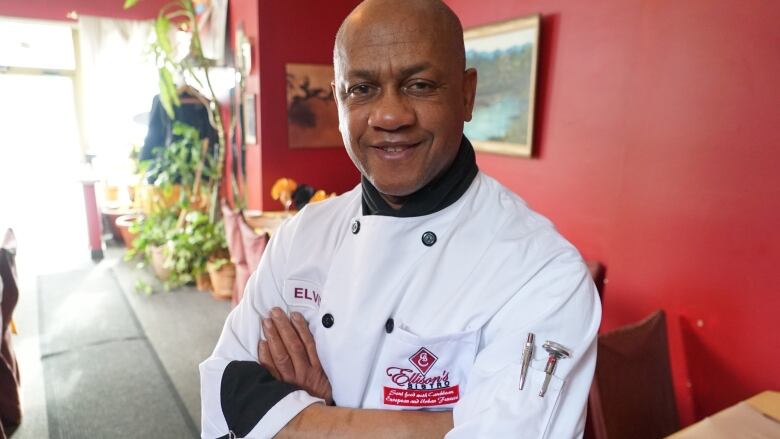A celebration of Black history month through food in Waterloo region
Elvis Ellison talks about the food he loves to eat and Andrew Coppolino shares restaurant recommendations

A great way to celebrateBlack History Month is to experience food fromWaterloo region's diverse communities.
This week, CBCKitchener-Waterloo's food columnist Andrew Coppolino was joined by special guest Elvis Ellison ofEllison's Bistro on The Morning Edition.
He talked about getting his start as a chef and the food he loves to eat. Andrew Coppolino also shared restaurants to check out for Black History Month.
Craig Norris: Elvis your restaurant is right across the street from the GRT terminal on Charles Street. You've been cooking in downtown Kitchener for 20years almost. Tell usabout Ellison's Bistro.
Elvis Ellison:Ellison's Bistro is right from my name, which is Elvis Ellison. Basically we're doing Caribbean food with a European flair because I was trained in England as a chef and I was born in Jamaica. So I just want to do a little bit of my own culture because working in the hotels I've done French cuisine for over 20 years. I say the rest is for my own heritage and that's what I want to go on now.
CN:I like what your card says. Your card says "soul food with Caribbean, European and urban finesse." What roledoes food play in your life?
EE: Well food is my life basically because I say the same thing to everybody I started cooking for my whole family of eight at the age of 12 years old, which my mother taught me because this I did not learn in school. It's our heritage. So I went to school basically to get my paper as a chef to say that I'm a qualified chef, but this is what I'm doing, it's from my country, from my hometown and most of all food is from African descent.
CN: Andrew, what other restaurants are there and what did you learn when you were out there talking with chefs?
Andrew Coppolino:The sharing part is interesting and what's really interesting too is like Elvis is a living example of someone who's been in the business here for 20 years or more. And I think that when you look at what's available in Waterloo region that's exactly what you find really long established restaurants that are part of the food culture. We've got two grocery stores, one in downtown. There's the tropical grocery store on KingswayDrive specializing in Afro-Caribbean foods.
We've got catering chefs and Derek Hines and Andrew Beckford. Ivy's Restaurant in Cambridge. We've got Mark's Caribbean Kitchen and Caribbean Cuisine both are restaurants that specialize in African Caribbean food. But interesting when I spoke to Mark at Mark's Caribbean, there's an Indian inspiration there as well. Things like dal puri and chana curry, foods that have sort of crossed cultures and come from one place to another.
Kevin Thomas who was at Sounds of the Seasons with us last year Big Jerk Smokehouse. He talks about Jamaican patties sort of the definitive grab and go street food. And you can find his patties across the region from Fresh Market in Guelph to theUniversity of Waterloo.
A very interesting recent addition to the scene is to Teneile Warren.She runs Nyam Revival Kitchen. She's a playwright and she's been here but 18 months came from Toronto. She does a lot of pop-up restaurants say at Counterpoint Brewing, for instance,where she's featuring the dishes from herculture, from her hometown.
CN: For you Elvis, what favourite dishes do you have from around the region? What do you like to eat?
EE:Me, I like seafood basically. Shrimp and basically southUSA home food and street food because a lot of what we eat is not things that you'd normally find inthe restaurants, but we bring it to the home and we bring it to the table.
CN: And what's a dish?
EE:Curry goat is very good.
CN: That's not seafood!
EE: (Laughs) It's not seafood, but you know I like red snapper. It's anything to do with the island because every food is the same, basically just changing ingredients like avocado. We like to do a dish in the restaurant. It's a veal and a seafood avocado and ginger glaze onion. I do like a rack of lamb with coffee liqueur. So a lot of things, we just change the ingredients and it's the exact same food.
AC:Elvis, would we find in the coastal regions patties say that have seafood in it whereas, whereas in the central region you'd find goat in there. It can be a regional cuisine as well, can't it?
EE: It can be. I'm bringing what I see in my island to the downtown and this is why I basically stick to downtown. I'm mixing with a younger crowd. Some of the things I've never seen, but I'm embracing it because we have to embrace the future and embrace the past at the same time. Makethem collide and give a big explosion to the downtown there because that's what we need.
CN: Haveyou noticeda change in people's curiosity about international food?
EE:Yes I have. I think people should keep an open mind because we're limited to say pizza and hot dog. I'm not knocking that. Butto me people say "that is realfood." That is not real food because when you eat our food, it's comfort food, but at the same time it coats your body andkeeps you like wanting more.
Edited for clarity and brevity.












_(720p).jpg)


 OFFICIAL HD MUSIC VIDEO.jpg)
.jpg)



























































































